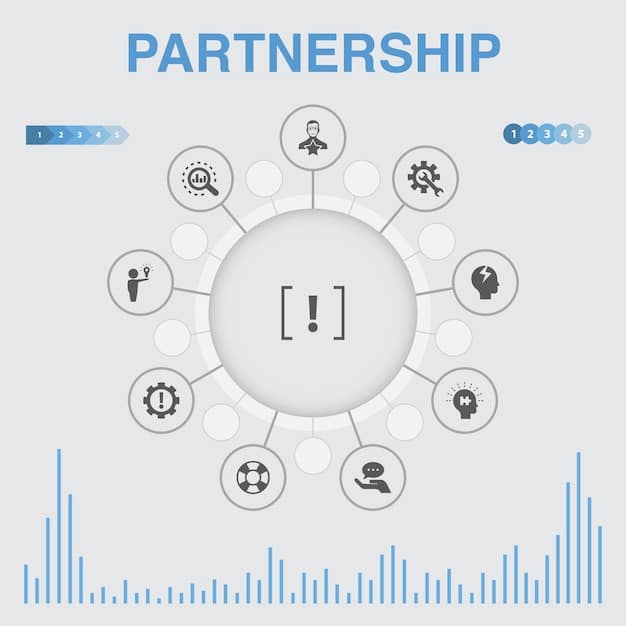Mastering Negotiation: Strategies for Success in Any Situation

Mastering the art of negotiation involves learning key strategies and techniques to effectively communicate, understand different perspectives, and reach mutually beneficial agreements in various professional and personal contexts.
Are you ready to unlock your potential and achieve your goals in any situation? Mastering the art of negotiation is a crucial skill that can significantly impact your personal and professional life. By understanding effective negotiation strategies, you can confidently navigate challenging conversations and achieve win-win outcomes.
Understanding the Core Principles of Negotiation
Negotiation is more than just haggling over prices. It’s a strategic communication process aimed at reaching an agreement that satisfies the interests of all parties involved. Understanding the core principles of negotiation is crucial for setting a solid foundation for success.
At its heart, negotiation is about finding common ground and building relationships. It requires empathy, active listening, and a willingness to compromise. Let’s delve into some fundamental principles that underpin effective negotiation.
Preparation is Key
Before entering any negotiation, thorough preparation is paramount. This involves researching the other party, understanding their needs and interests, and identifying your own goals and priorities. Knowing your walk-away point is equally important.
Active Listening and Empathy
Effective negotiation hinges on active listening and demonstrating empathy. By truly hearing and understanding the other party’s perspective, you can identify opportunities for mutually beneficial solutions. Empathy helps build trust and rapport, facilitating smoother discussions.
- Research the other party: Understand their background, interests, and negotiation style.
- Define your goals: Clearly outline what you want to achieve and what you are willing to concede.
- Identify your BATNA: Determine your Best Alternative To a Negotiated Agreement to avoid accepting unfavorable terms.
- Practice active listening: Pay attention to verbal and non-verbal cues to understand the other party’s needs and concerns.
In summary, the core principles of negotiation involve understanding the strategic nature of the process, preparing meticulously, actively listening, and fostering empathy. These principles provide a strong foundation for achieving successful negotiation outcomes.
Essential Negotiation Strategies for Every Scenario
Negotiation is not a one-size-fits-all skill. Different situations require different strategies. Whether you are discussing a salary increase, closing a business deal, or resolving a conflict at home, having a range of negotiation strategies at your disposal is essential.
Adopting the right strategies can significantly increase your chances of achieving a favorable outcome. Here are some essential negotiation strategies you should master.

Collaborative Negotiation
Collaborative negotiation focuses on creating value for all parties involved. It involves identifying common interests and working together to find solutions that meet everyone’s needs. This approach fosters long-term relationships and builds trust.
Competitive Negotiation
In contrast to collaborative negotiation, competitive negotiation is more assertive and aims to maximize gains for one party. This strategy is often used in situations where there is limited opportunity for future interaction and a clear power imbalance.
Additional negotiation strategies include:
- Compromising: Finding a middle ground where each party makes concessions.
- Accommodating: Prioritizing the other party’s needs over your own.
- Avoiding: Postponing or withdrawing from the negotiation if the timing is not right.
- Assertiveness: Clearly communicating your needs and expectations without being aggressive.
Mastering essential negotiation strategies involves understanding different approaches and adapting them to suit various scenarios. By employing collaborative, competitive, and other strategic techniques, you can enhance your negotiation effectiveness and achieve favorable outcomes.
Building Rapport: The Foundation of Successful Negotiations
Rapport is the harmonious connection between people that fosters trust and understanding. In negotiation, building rapport can significantly enhance communication, reduce tension, and increase the likelihood of reaching a mutually satisfactory agreement.
Creating a positive and comfortable environment is crucial for establishing rapport. Here’s how you can build rapport to enhance your negotiation outcomes.
Non-Verbal Communication
Non-verbal cues, such as body language and facial expressions, play a significant role in building rapport. Maintaining eye contact, using open body language, and mirroring the other party’s gestures can create a sense of connection and understanding.
Finding Common Ground
Identifying shared interests, values, or experiences can help establish a common ground and build rapport. Start by asking questions to uncover similarities and demonstrate genuine interest in the other party’s perspective.

Building rapport involves more than just friendly conversation. It requires genuine engagement and thoughtful interaction. Strategies include:
- Active Listening: Show genuine interest by listening attentively and responding thoughtfully.
- Empathy: Acknowledge and validate the other person’s feelings and perspective.
- Positive Attitude: Maintain a cheerful and optimistic demeanor to create a pleasant atmosphere.
- Respect: Treat the other party with courtesy and consideration, even when disagreements arise.
Establishing rapport is fundamental to successful negotiations. By focusing on non-verbal communication, finding common ground, and demonstrating genuine engagement, you can build trust, facilitate smoother discussions, and increase the likelihood of achieving favorable agreements.
Overcoming Common Negotiation Obstacles
Negotiations rarely proceed without encountering some form of obstacle. Whether it’s dealing with difficult personalities, navigating power imbalances, or reaching a compromise on conflicting interests, overcoming these obstacles is essential for a successful outcome.
Anticipating and preparing for potential obstacles can make the negotiation process smoother and more effective. Here are some common negotiation obstacles and strategies to overcome them.
Dealing with Difficult Personalities
Negotiating with aggressive, inflexible, or unreasonable individuals can be challenging. Staying calm, focusing on the issues, and using assertive communication can help manage difficult personalities. Setting boundaries and knowing when to walk away are also crucial.
Navigating Power Imbalances
Power imbalances can create an uneven playing field in negotiations. Recognizing the imbalance and leveraging your own strengths, such as expertise or market knowledge, can help level the playing field. Building alliances and seeking support can also enhance your position.
Common negotiation obstacles and strategies to overcome them include:
- Impasse: Suggest alternative solutions, reframe the issue, or take a break to allow emotions to cool down.
- Emotional outbursts: Respond calmly and empathetically, and focus on the facts rather than emotions.
- Unrealistic demands: Challenge the demands by asking for justification and offering counterproposals.
- Lack of trust: Build trust by being transparent, reliable, and keeping your commitments.
Successfully navigating negotiations requires anticipating and overcoming common obstacles. By addressing difficult personalities, power imbalances, and other challenges, you can enhance communication, build trust, and increase the likelihood of reaching mutually beneficial agreements.
Advanced Negotiation Techniques for Skilled Negotiators
For those looking to elevate their negotiation skills, advanced techniques can provide a competitive edge. These techniques often involve sophisticated strategies, psychological insights, and a deep understanding of negotiation dynamics.
Mastering advanced negotiation techniques requires practice and a willingness to experiment. Here are some advanced techniques to refine your negotiation prowess.
Anchoring
Anchoring involves setting an initial offer or expectation that influences the other party’s perception of value. By making a strategic first offer, you can shape the negotiation range and increase the likelihood of achieving a favorable outcome.
Framing
Framing involves presenting information in a way that influences the other party’s decision-making. By emphasizing the benefits, downplaying the risks, or highlighting the potential losses, you can sway the other party’s perception and gain an advantage.
Additional advanced negotiation techniques to consider:
- The Decoy Effect: Introducing a third, less attractive option to make one of the original options more appealing.
- Loss Aversion: Highlighting potential losses to motivate the other party to take action.
- The Salami Technique: Making small, incremental requests to gradually achieve a larger objective.
- Good Guy/Bad Guy: Using a team approach where one negotiator is tough and demanding, while the other is friendly and accommodating.
Skilled negotiators understand that advanced techniques require careful planning and execution. Mastering these techniques can provide a competitive edge and enhance your ability to achieve favorable outcomes in complex negotiations.
Ethics and Integrity in Negotiation
While achieving favorable outcomes is often the goal, ethical considerations are paramount in negotiation. Maintaining integrity not only ensures fair dealings but also fosters long-term relationships and builds a strong reputation.
Ethical negotiation involves honesty, transparency, and respect for the other party’s rights and dignity. Here’s why ethics and integrity are crucial in negotiation.
Honesty and Transparency
Being honest and transparent in your communication builds trust and credibility. Omitting essential information or misrepresenting facts can damage relationships and lead to legal repercussions. Ethical negotiators provide accurate and complete information.
Respect for the Other Party
Treating the other party with respect, even when disagreements arise, fosters a positive negotiation environment. Avoid personal attacks, listen attentively to their perspective, and acknowledge their contributions. Respectful negotiation promotes goodwill and facilitates smoother discussions.
Ethical considerations in negotiation also include:
- Avoiding deceptive tactics: Refrain from using manipulative or dishonest strategies to gain an advantage.
- Keeping promises: Honor your commitments and agreements to maintain credibility and trust.
- Protecting confidential information: Respect the privacy of sensitive information shared during negotiations.
- Ensuring fairness: Strive for outcomes that are mutually beneficial and equitable for all parties involved.
Ethical negotiation is not just about avoiding legal trouble. It’s about building strong, lasting relationships based on trust and respect. By maintaining honesty, transparency, and respect for the other party, you can negotiate with integrity and achieve outcomes that are both favorable and ethical.
| Key Point | Brief Description |
|---|---|
| 🤝 Collaborative Approach | Focus on mutual gains and building long-term relationships. |
| 👂 Active Listening | Understand the other party’s needs and concerns. |
| 🎯 Ethical Conduct | Maintain honesty and integrity throughout the negotiation. |
| 💪 Preparation | Research and define your goals before negotiating. |
Frequently Asked Questions
▼
Active listening is arguably the most vital skill, as it allows you to understand the other party’s needs and motivations, fostering better communication and potential solutions.
▼
Stay calm, focus on the issues, and avoid escalating the situation. Assertively communicate your boundaries and be prepared to walk away if necessary to protect your interests.
▼
Try reframing the issue or suggesting alternative solutions. Taking a break to cool down and reassess can also help find new avenues of communication and potential compromises.
▼
Rapport creates trust and understanding, making it easier to communicate effectively and find common ground. It reduces tension, fostering a more collaborative environment for reaching agreements.
▼
Practice regularly, seek feedback, and study successful negotiators. Continuous learning, combined with real-world experience, will refine your techniques and enhance your effectiveness over time.
Conclusion
Mastering the art of negotiation is an ongoing journey that involves continuous learning, practice, and self-reflection. By integrating the strategies and techniques discussed, you can enhance your negotiation skills and achieve your goals in any situation.





